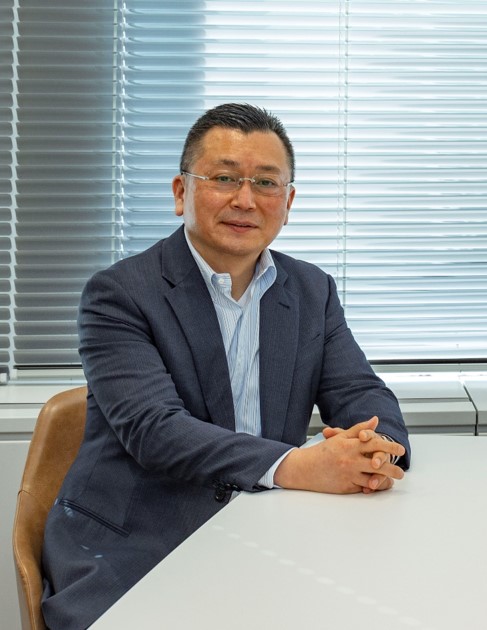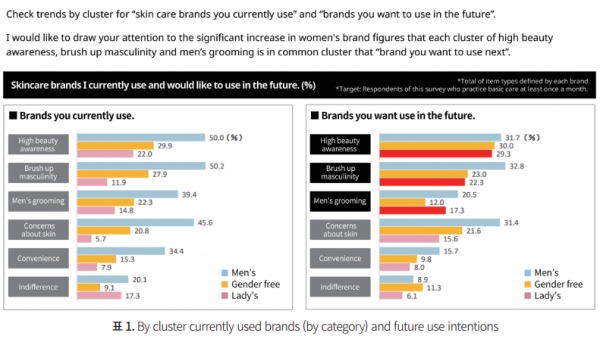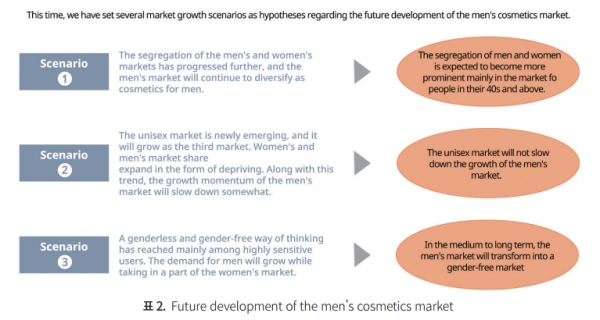三原 誠史 sophialinks, CEO

Q. Please introduce your company and yourself.
We are a consulting company specializing in the cosmetics industry. We provide product development, branding, and marketing support for major cosmetics manufacturers as well as start-up manufacturers.
Q2. What’s the topic you presented at COSME Tokyo 2023, and why did you conduct this survey? Please explain about the results. (10,000 survey results for male cosmetics development)
The background of the survey on the men's category in the Japanese cosmetics market this time is that due to many brands targeting the men's cosmetics market have appeared in the Japanese market over the few years, and many of these brands have steadily expanded their popularity and resulted in great success in business. This situation has been occurring not only in Japan, but also in China and South Korea, and the men’s market has been rapidly increasing. Another major reason for conducting the survey was that we predicted that there is a high possibility that it will become an important trend in the cosmetics market of each country in the future. As a result of this survey of the men's cosmetics market, the biggest topic was that the men's market, especially among the younger generation was transforming into a gender-free market. The survey confirmed that the cosmetics used by men are not only cosmetics made by manufacturers for men, but are becoming cosmetics that are selected with a genderless mood, regardless of gender and generation.
Q. What’s the most important thing we should watch carefully among the results of your survey?
the survey shows the men's cosmetics market is becoming more gender-free, especially among the younger generation. The higher the cosmetics sensitivity, the more gender-free mood tends to be particularly strong. When researched the brand of men's cosmetics currently using, MUJI brands took the top. This result means that people who sympathize with the lifestyle concept of MUJI purchase men's cosmetics rather than brands that appeal men's cosmetics. This is a remarkable result. In other words, gender differences are not directly linked to purchasing behavior. Also, when asked about the genre of cosmetic products that they would like to use in the future, the three influential segments also showed a strong tendency to select women's brands.
Q. Based on your survey, do they buy men’s cosmetics themselves or do they receive gifts from friends or wife? Why do they purchase men’s cosmetics? For what?
Among skin care item users, more than 80% select products by themselves for "lotion", "face wash foam/face wash", "emulsion/cream", "sunscreen", "all-in-one cosmetics", and "lip balm". have purchased. On the other hand, we found that the self-selection and self-purchase of “serum”, “cleansing”, “eye cream” and “sheet mask” is slightly lower than other products.
Q. Why to use men’s cosmetics? Where’s the channel that distribute the men’s cosmetics?
The most popular sales channels for men's cosmetics are drugstores, e-commerce, and variety shops, in that order.
Q. What’s the global trend of men’s cosmetics market?
Since this survey was limited to Japan, it is not possible to know global trends from the survey results, however, it is well known in the industry that the men's market in China and South Korea has grown significantly in recent years.
Q. How do you think about the Japanese and Korean men’s cosmetics market?
I think Japanese men's cosmetics lead other countries in terms of quality. This trend is similar to the women's market, where made-in-Japan products are trusted by many consumers. I think that Korean men's cosmetics are accepted as items that are ahead of the times in Japan. In the entertainment industry, South Korea leads the world and gather attention. Because of this, it can be said that there is a high level of interest in Korean cosmetics among Japanese people who are highly sensitive to cosmetics.


Q. Is there a difference between men’s and women’s cosmetics Research & Development?
At present, there is no major difference in research and development, but there are Japanese manufacturers that focus on the differences in skin types between men and women. I believe that the results will be used in product development in the future. By being conscious about gender differences are more important in marketing strategies rather than in research and development, and the brand supporters will change greatly depending on the brand philosophy, the brand image, and how to transmit the brand message.
Q. When it comes to ingredient or raw materials, is it different between men’s and women’s cosmetics? (If so, why?) How do you outlook for the men’s cosmetics market in the future?
One of the characteristics of men is that they have more oil in their skin than women. I think there are cases where ingredients and raw materials that are effective in oil control appear as differences in women's cosmetics Another characteristic of the Japanese men's market is that there are big differences depending on the age. There is a difference in the ideal skin condition between the younger generation and the middle generation. Younger generations in Japan are particularly interested in cosmetics that have a whitening effect, as they ideally have translucent white skin and smooth skin, and this is a trend that is rarely seen in the middle generation.
Q. What insights would you like to get from this survey?
In this research, we set three hypotheses for the growth scenario of the men's market. We conducted a survey to verify that hypothesis. First, the segregation of the men's and women's markets in Scenario 1 has progressed further, The men's market will continue to diversify as cosmetics for men. The scenario of continued expansion is, It is expected to become more prominent mainly in the market for people in their 40s and above. Next, Scenario 'Unisex market' will emerge along with the growth of the men’s market. Continue to grow as the third market, in both the men's market and unisex market will support future market demand for men. Regarding this scenario in this study, neither men nor women, the tendency is a neutral concept has not emerged as a particularly noticeable tendency. If anything, there is a tendency that "Gender-agnostic intention", so-called “gender neutral” is becoming stronger with the rise of the androgynous unisex market. We do not expect the growth of the men's market to slow down. And for the final scenario, A genderless and gender-free way of thinking has reached mainly among highly sensitive users. A certain number of men will use women's brands without hesitation. Grow in the men taking part of the women's market, it becomes difficult to get a picture of the men's market simply by looking at the market as a men's market. In a big sense, it will grow as a gender-free market. When looking at the future from a medium- to long-term perspective, this scenario 3 representing future trends in the men's market. I anticipate that this is the most likely scenario. However, today's 20s are the main layer of the men's market, and we need more time to become a market leader. In the meantime, the impact of Korean cosmetics that I introduced earlier, in combination with the expansion of the makeup category that this survey did not mention, it is believed that the market will shift to a gender-free market over time.

